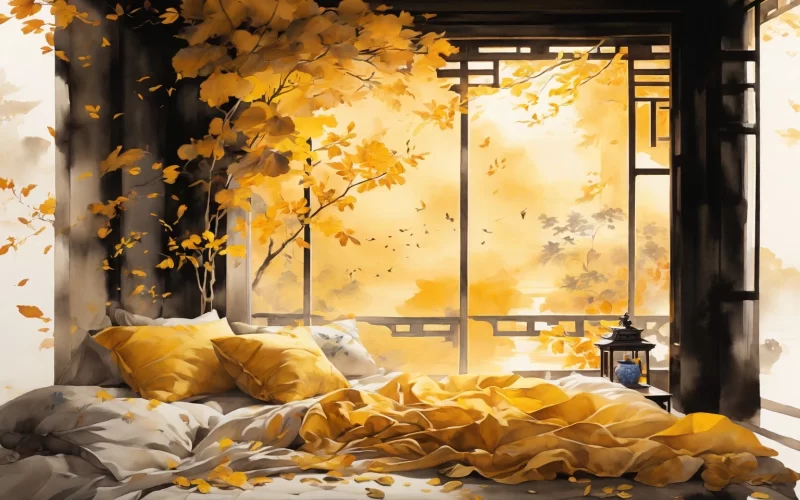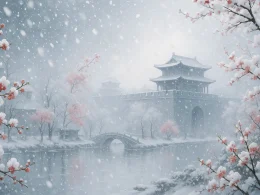Far and wide stretch mist-veiled trees;
The mountains cold show but heart-breaking green.
Dusk invades the tower high
Where someone is sighing.
On the marble steps she waits in vain;
Birds suddenly fly back to their nest.
Where is the way that may bring him back to her?
There’re long, long pavilions far and nigh.
Original Poem
「菩萨蛮 · 平林漠漠烟如织」
李白
平林漠漠烟如织,寒山一带伤心碧。
暝色入高楼,有人楼上愁。
玉阶空伫立,宿鸟归飞急。
何处是归程?长亭连短亭。
Interpretation
Regarded as one of the "Buddhist Dancers" alongside "Dream of a Fair Maiden" this ci poem, despite disputes over its authorship, has long been celebrated for its artistic excellence. Set against a late autumn dusk, the poem constructs a vast landscape of wandering through imagery like "spreading woods," "chilly mountains," "dusk hues," and "returning birds," profoundly expressing the poet's deep solitude and existential confusion about life's path and spiritual homecoming.
First Couplet: "平林漠漠烟如织,寒山一带伤心碧。"
Píng lín mòmò yān rú zhī, hán shān yídài shāngxīn bì.
Spreading woods stretch far, mist-woven like cloth; A belt of chilly mountains—heart-stricken jade.
The opening establishes a vast, desolate tone. "Far-stretching" and "mist-woven" merge visual haze with tactile texture, materializing mist into tangible sorrow. "Chilly mountains" and "heart-stricken jade" exemplify emotional transference, where the poet's inner "chill" and "heartache" are projected onto nature, dyeing the landscape with subjective feeling—a perfect illustration of "viewing things through the self, thus all things bear my colors."
Second Couplet: "暝色入高楼,有人楼上愁。"
Míngsè rù gāo lóu, yǒu rén lóu shàng chóu.
Dusk seeps into the high tower; Someone grieves upstairs, hour by hour.
This couplet narrows the focus to concentrate emotion. "Seeps" brilliantly transforms intangible dusk into a pervasive, penetrating entity, bringing not just fading light but psychological weight. "Someone grieves upstairs" reveals the protagonist's mood. This "someone" is both the poet and all wanderers far from home across time; its ambiguity universalizes the emotion.
Third Couplet: "玉阶空伫立,宿鸟归飞急。"
Yù jiē kōng zhùlì, sù niǎo guī fēi jí.
On marble steps, in vain he stands; Roosting birds fly home in urgent bands.
Intense contrast heightens the inner loneliness. "In vain" conveys futile waiting and time's anxious passage, while "roosting birds fly home in urgent bands" uses nature's "having a home" to contrast the wanderer's "homelessness." The birds' "urgency" sharpens the wanderer's anxiety about his uncertain path.
Fourth Couplet: "何处是归程?长亭连短亭。"
Héchù shì guī chéng? Cháng tíng lián duǎn tíng.
Where is the pathway home? Long road-inns melt into short inns far away.
The emotional climax erupts in a question, answered with a visual scene that leaves endless resonance. "Where" expresses confusion, yearning, and despair. The reply—"long road-inns melt into short inns far away"—paints the cruel reality: these continuous waystations symbolize life's endless wandering, a journey so prolonged it evokes weariness and nihilism, stretching personal grief into a bleak recognition of life's journey.
Holistic Appreciation
Structurally, the poem moves from distant to near, vast to minute, and back to the spiritual, forming a perfect loop. The first stanza shifts from broad views (woods, mountains) to a mid-scene (tower), focusing on "human" "sorrow"; the second stanza moves from action (standing) to nearby scenes (birds), finally gazing into the endless distance (roadside inns), completing a cycle from outer world to inner heart and back. Like a masterfully shot film, emotion accumulates and deepens through layered scenery, achieving a "soundless resonance more powerful than sound" in the vast view of "long and short inns," elevating the sorrow of wandering into philosophical contemplation of life's essence.
Artistic Merits
- Three-Dimensional Construction of Atmosphere: The poet skillfully blends vision (hazy mist, heart-stricken jade), sensation (chilly mountains, dusk), and inner mood (sorrow), building a multi-dimensional emotional space.
- Masterful Use of Contrast and Juxtaposition: The birds' "having homes" versus the wanderer's "homelessness," the marble steps' "still standing" versus the birds' "urgent flight"—all highlight the protagonist's loneliness and confusion through stark contrast.
- Highly Condensed Language with Symbolic Depth: "Marble steps" suggest nobility of status or setting, contrasting inner desolation; "long and short inns" are not just scenery but classic symbols of life's long road and endless wandering.
- Open-Ended Conception: Ending with scene over direct emotion, it casts endless sorrow upon an endless road, leaving the answer beyond the frame to reader's imagination and resonance, maximizing artistic effect.
Insights
This poem touches an eternal human theme—homesickness and belonging. It tells us that spiritual "homelessness" is a shared human experience transcending eras. What Li Bai (or the anonymous poet) depicts is not just geographical inability to return home, but the modern anxiety of a soul finding no place of rest. In our age of accelerated mobility, we are all wanderers in a sense. The lesson of "long and short inns" lies in this: life's meaning may not lie in reaching a fixed destination, but in how we face the inevitable loneliness and confusion on this long road, and inwardly construct our own unshakable spiritual home while moving forward. The true "pathway home" is a journey inward.
About the poet

Li Bai (李白), 701 - 762 A.D., whose ancestral home was in Gansu, was preceded by Li Guang, a general of the Han Dynasty. Tang poetry is one of the brightest constellations in the history of Chinese literature, and one of the brightest stars is Li Bai.












